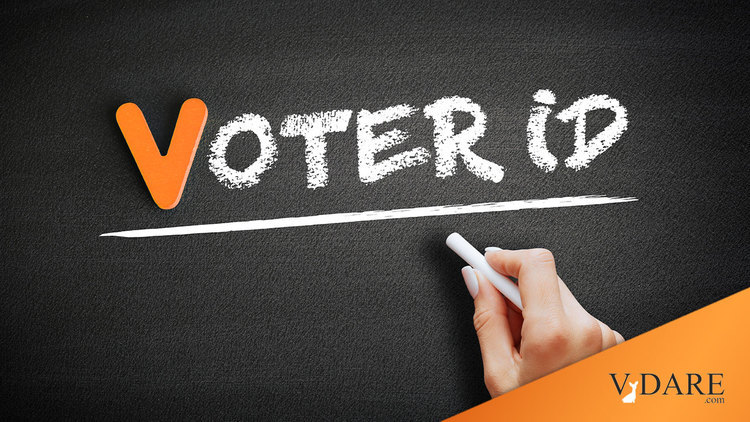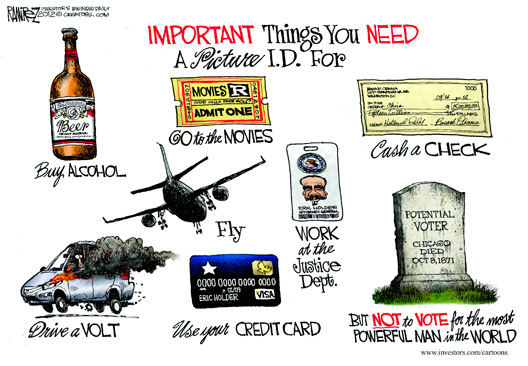
Senator Rand Paul Says GOP Should Forget about Voter ID
05/10/2014
As we look ahead to the 2016 Presidential election, the Stupid Party is showing its stuff. Today’s example is Republican Senator Rand Paul, noted here previously for promoting mass legalization for unlawful aliens and making America bilingual Spanish.
Now Paul says preventing election fraud by insisting on voter identification is a bad idea. It seems he met with some black pastors who convinced him that the requirement is offensive to them.
Are the pastors suggesting that black citizens are too lame to acquire the same sort of identification that is ubiquitous in American life today??
The nation has changed, as the diversity cheerleaders like to remind us. As a result of immigration plus technology, America is no longer the free and easy place it once was. One example is the need for government identification to do anything.
Meanwhile, in the nation as a whole, a voter ID requirement remains enormously popular, as shown by numerous polls. If there is a major issue with more widespread approval, I can’t think of it. Senator Paul is an idiot to blow off such a highly favored topic. He certainly gives libertarians a well-deserved bad name for their open-borders craziness.
? A July 2013 McClatchy poll found 83 percent of persons surveyed thought voter ID was a good thing, including 65 percent of self-identified “very liberal” respondents.
? A 2012 Rasmussen poll determined that 71 percent of voters believe voter ID should be required at elections.
? A 2012 Fox News poll ascertained that 70 percent of those queried thought voter ID laws are necessary.
? A March 2014 Rasmussen poll found that 78 percent of likely voters believe that proof of citizenship should be required in order to register to voter.
As usual, The New York Times likes to promote Democrat-lite Republican pols like Paul, giving this story a front-page spot on Saturday.
Paul Diverges From His Party Over Voter ID, New York Times, MAY 9, 2014MEMPHIS — Senator Rand Paul of Kentucky broke Friday with fellow Republicans who have pushed for stricter voting laws as a way to crack down on fraud at the polls, saying that the focus on such measures alienates and insults African-Americans and hurts the party.
“Everybody’s gone completely crazy on this voter ID thing,” Mr. Paul said in an interview. “I think it’s wrong for Republicans to go too crazy on this issue because it’s offending people.”
Mr. Paul becomes the most prominent member of his party — and among the very few — to distance himself from the voting restrictions and the campaign for their passage in states under Republican control, including North Carolina, Ohio and Wisconsin, that can determine presidential elections. Civil rights groups call the laws a transparent effort to depress black turnout.
Speaking here in a mostly black and Democratic city with its own painful history of racism, Mr. Paul said that much of the debate over voting rights had been swept up in the tempest of racial politics.
The senator has had his own struggles with civil rights issues, hedging at times on his support for the Civil Rights Act of 1964. And, notably, he did not on Friday denounce voter ID laws as bad policy or take back previous statements in which he had said it was not unreasonable for voters to be required to show identification at the polls. He says these laws should be left to the states. (Kentucky does not have a restrictive voter identification statute.)
Instead, in his comments, he suggested that Republicans had been somewhat tone deaf on the issue. In the last three years, the voting rights fight has extended to more than 30 states and taken on a more partisan tone. The measures that have passed or are under consideration vary. Some require that voters come to the polls with a birth certificate, passport or other proof of citizenship. Others would cut back on early voting.
The movement gained momentum last year after the Supreme Court struck down a central provision of the 1965 Voting Rights Act that had required mostly Southern states to get Justice Department approval before changing its voting laws. States moved quickly, and since the decision last June, about a dozen have passed laws creating stricter regulations for voting.
Few issues ignite such passion among the base of both parties. Democrats argue that the laws are intended to keep poor voters away from the polls because they often have difficulty obtaining identification. Republicans contend cheating is rife in today’s elections.
Mr. Paul was in Memphis for the Republican National Committee’s spring meeting, but beforehand, he sat down to discuss his views on voting rights, public education and antipoverty policies with a group of black pastors.
Afterward, in a news conference, Mr. Paul admitted he still had a lot of work to do. Sometimes, he said, his audiences tell him: “I like what you’re saying. I’m still not voting for you.” [ … ]

